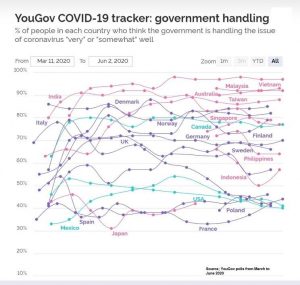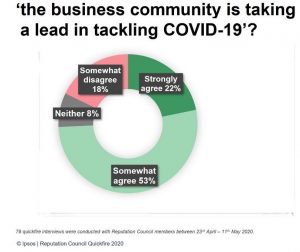As we navigate our way through the global pandemic, the immense loss of 416,000 lives is sobering. We are possibly also facing the most intense recession in history. This week, the OECD issued a downward revision towards a 7.6% projected decline in global GDP for 2020 and the ILO estimates an equivalent of 305 million jobs will be lost by the end of June. The 2008/9 financial crisis looks positively meek in comparison, with its GDP decline of 1.79% and 22 million jobs lost.
The impact on brands will also be significant. In the recently released India Top 100 brands report, David Haigh, the CEO of BrandFinance, stated that,
“India’s leading brands will see a 15% decline in their brand value in the coming year, an equivalent of US$25 billion. In the larger global context, this trend could culminate into US$ 1 trillion in lost brand value worldwide.”
Yet, as gloomy as this prognosis looks, most experts are still predicting a sharp recovery in 2021 on all these fronts, be it the economy, jobs or brand value. Whether through the breakthrough offered by a vaccine, a cure, the attainment of herd immunity or just adjustments in business models and workspaces to deal with successive waves of the pandemic, the expectation is that there is a viable exit strategy to be had in the near future.
For businesses that are looking at the longer term, the recession they need to be even more concerned about is of a different kind – the reputation recession.
Societal trust in institutions – be it governments, businesses, media or experts, has been on the vane over recent years. Edelman’s Trust barometer for this year indicated that only 58% of respondents trusted business and NGOs, while an even lower 49% trusted governments and media.
 The current pandemic has the potential to dramatically impact these figures over the coming months. Governments appear to be benefitting in the short term. A YouGov poll indicates a Covid bump for most governments. With the exception of the US, UK and Mexico, most countries have majorities or upswing in sentiment towards how their governments have handled the pandemic. This is volatile and will change as the situation evolves. As a glaring example, the UK saw a steep decline in public trust from 72% to 41% in just 8 weeks.
The current pandemic has the potential to dramatically impact these figures over the coming months. Governments appear to be benefitting in the short term. A YouGov poll indicates a Covid bump for most governments. With the exception of the US, UK and Mexico, most countries have majorities or upswing in sentiment towards how their governments have handled the pandemic. This is volatile and will change as the situation evolves. As a glaring example, the UK saw a steep decline in public trust from 72% to 41% in just 8 weeks.
Given the anxiety, stress, pressure and emotions that the pandemic and its aftermath will evoke, businesses need to be watchful that they do not get caught up in a reputation recession. The Edelman Research concluded that ethical attributes drive 76% of trust capital for global companies, while competence and performance only accounts for 24%.
How companies and their leaders behave in this time of crisis will define their brands and reputations for years to come. Those which behave responsibly towards their clients, employees, partners and society will could significantly upside in their equity with their customers. Those that champion the causes of inclusion, equity, fairness, climate and societal responsibility, will create stronger emotion connections with their stakeholders. In contrast, companies that are perceived to behave unethically or irresponsibly, will find that consumers will opt for alternatives, even when they are back to business as usual.
 Smart businesses understand this and are rising to the occasion. A quickfire poll of Chief Communications Officers by Ipsos Mori’s Reputation Center confirmed that 75% of respondents believed that the business community is taking a lead in tackling Covid-19. The World Economic Forum (WEF) has assembled a Covid- Action platform assembling many leading companies in efforts to provide relief and combat the pandemic. Its Executive Chairman, Professor Klaus Schwab, states: “To achieve a better outcome, the world must act jointly and swiftly to revamp all aspects of our societies and economies, from education to social contracts and working conditions. Every country must participate, and every industry, from oil and gas to technology, must be transformed. In short, we need a “Great Reset” of capitalism.”
Smart businesses understand this and are rising to the occasion. A quickfire poll of Chief Communications Officers by Ipsos Mori’s Reputation Center confirmed that 75% of respondents believed that the business community is taking a lead in tackling Covid-19. The World Economic Forum (WEF) has assembled a Covid- Action platform assembling many leading companies in efforts to provide relief and combat the pandemic. Its Executive Chairman, Professor Klaus Schwab, states: “To achieve a better outcome, the world must act jointly and swiftly to revamp all aspects of our societies and economies, from education to social contracts and working conditions. Every country must participate, and every industry, from oil and gas to technology, must be transformed. In short, we need a “Great Reset” of capitalism.”
While no business can outrun the oncoming economic recession in the medium-term, escaping the longer-term reputation recession is solely up to them.
The views and opinions published here belong to the author and do not necessarily reflect the views and opinions of the publisher.



Be the first to comment on "The oncoming reputation recession"